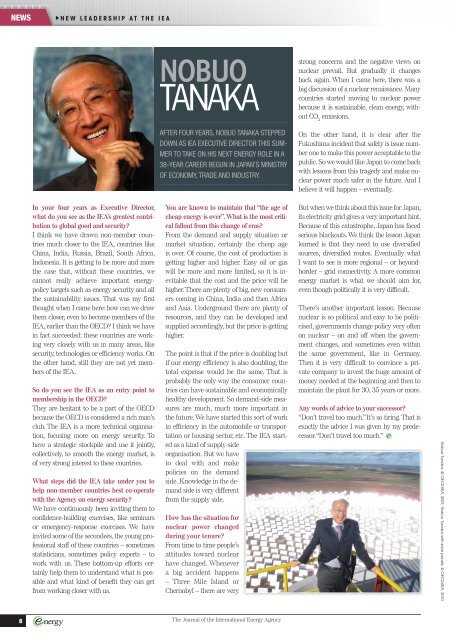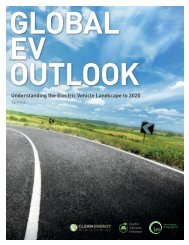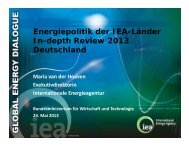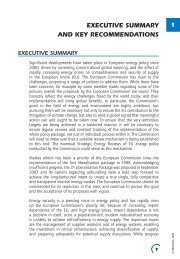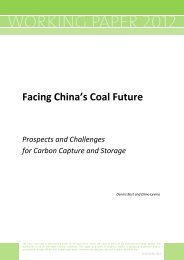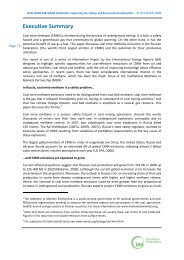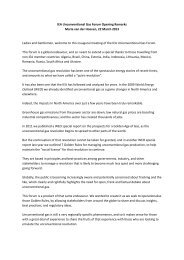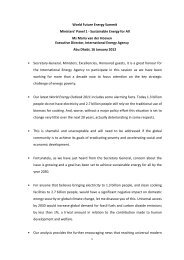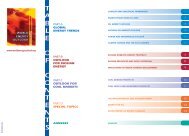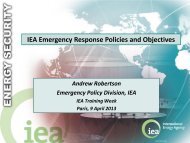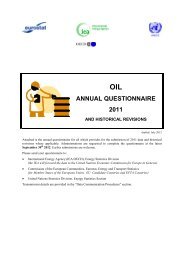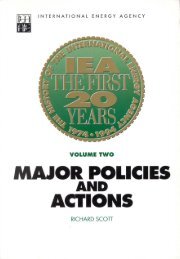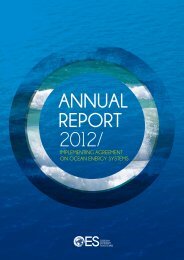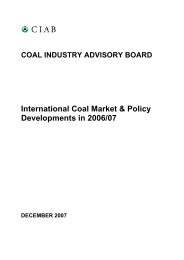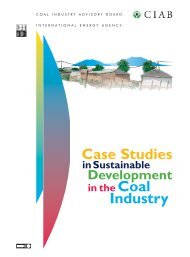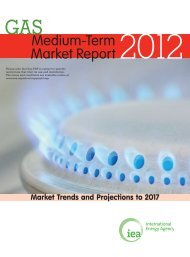The Journal of the International Energy Agency - IEA
The Journal of the International Energy Agency - IEA
The Journal of the International Energy Agency - IEA
Create successful ePaper yourself
Turn your PDF publications into a flip-book with our unique Google optimized e-Paper software.
NEWS<br />
NEW LEADERSHIP AT THE <strong>IEA</strong><br />
NOBUO<br />
TANAKA<br />
strong concerns and <strong>the</strong> negative views on<br />
nuclear prevail. But gradually it changes<br />
back again. When I came here, <strong>the</strong>re was a<br />
big discussion <strong>of</strong> a nuclear renaissance. Many<br />
countries started moving to nuclear power<br />
because it is sustainable, clean energy, without<br />
CO 2<br />
emissions.<br />
AFTER FOUR YEARS, NOBUO TANAKA STEPPED<br />
DOWN AS <strong>IEA</strong> EXECUTIVE DIRECTOR THIS SUM-<br />
MER TO TAKE ON HIS NEXT ENERGY ROLE IN A<br />
38-YEAR CAREER BEGUN IN JAPAN’S MINISTRY<br />
OF ECONOMY, TRADE AND INDUSTRY.<br />
On <strong>the</strong> o<strong>the</strong>r hand, it is clear after <strong>the</strong><br />
Fukushima incident that safety is issue number<br />
one to make this power acceptable to <strong>the</strong><br />
public. So we would like Japan to come back<br />
with lessons from this tragedy and make nuclear<br />
power much safer in <strong>the</strong> future. And I<br />
believe it will happen – eventually.<br />
In your four years as Executive Director,<br />
what do you see as <strong>the</strong> <strong>IEA</strong>’s greatest contribution<br />
to global good and security?<br />
I think we have drawn non-member countries<br />
much closer to <strong>the</strong> <strong>IEA</strong>, countries like<br />
China, India, Russia, Brazil, South Africa,<br />
Indonesia. It is getting to be more and more<br />
<strong>the</strong> case that, without <strong>the</strong>se countries, we<br />
cannot really achieve important energypolicy<br />
targets such as energy security and all<br />
<strong>the</strong> sustainability issues. That was my first<br />
thought when I came here: how can we draw<br />
<strong>the</strong>m closer, even to become members <strong>of</strong> <strong>the</strong><br />
<strong>IEA</strong>, earlier than <strong>the</strong> OECD? I think we have<br />
in fact succeeded: <strong>the</strong>se countries are working<br />
very closely with us in many areas, like<br />
security, technologies or efficiency works. On<br />
<strong>the</strong> o<strong>the</strong>r hand, still <strong>the</strong>y are not yet members<br />
<strong>of</strong> <strong>the</strong> <strong>IEA</strong>.<br />
So do you see <strong>the</strong> <strong>IEA</strong> as an entry point to<br />
membership in <strong>the</strong> OECD?<br />
<strong>The</strong>y are hesitant to be a part <strong>of</strong> <strong>the</strong> OECD<br />
because <strong>the</strong> OECD is considered a rich man’s<br />
club. <strong>The</strong> <strong>IEA</strong> is a more technical organisation,<br />
focusing more on energy security. To<br />
have a strategic stockpile and use it jointly,<br />
collectively, to smooth <strong>the</strong> energy market, is<br />
<strong>of</strong> very strong interest to <strong>the</strong>se countries.<br />
What steps did <strong>the</strong> <strong>IEA</strong> take under you to<br />
help non-member countries best co-operate<br />
with <strong>the</strong> <strong>Agency</strong> on energy security?<br />
We have continuously been inviting <strong>the</strong>m to<br />
confidence-building exercises, like seminars<br />
or emergency-response exercises. We have<br />
invited some <strong>of</strong> <strong>the</strong> secondees, <strong>the</strong> young pr<strong>of</strong>essional<br />
staff <strong>of</strong> <strong>the</strong>se countries – sometimes<br />
statisticians, sometimes policy experts – to<br />
work with us. <strong>The</strong>se bottom-up efforts certainly<br />
help <strong>the</strong>m to understand what is possible<br />
and what kind <strong>of</strong> benefit <strong>the</strong>y can get<br />
from working closer with us.<br />
You are known to maintain that “<strong>the</strong> age <strong>of</strong><br />
cheap energy is over”. What is <strong>the</strong> most critical<br />
fallout from this change <strong>of</strong> eras?<br />
From <strong>the</strong> demand and supply situation or<br />
market situation, certainly <strong>the</strong> cheap age<br />
is over. Of course, <strong>the</strong> cost <strong>of</strong> production is<br />
getting higher and higher. Easy oil or gas<br />
will be more and more limited, so it is inevitable<br />
that <strong>the</strong> cost and <strong>the</strong> price will be<br />
higher. <strong>The</strong>re are plenty <strong>of</strong> big, new consumers<br />
coming in China, India and <strong>the</strong>n Africa<br />
and Asia. Underground <strong>the</strong>re are plenty <strong>of</strong><br />
resources, and <strong>the</strong>y can be developed and<br />
supplied accordingly, but <strong>the</strong> price is getting<br />
higher.<br />
<strong>The</strong> point is that if <strong>the</strong> price is doubling but<br />
if our energy efficiency is also doubling, <strong>the</strong><br />
total expense would be <strong>the</strong> same. That is<br />
probably <strong>the</strong> only way <strong>the</strong> consumer countries<br />
can have sustainable and economically<br />
healthy development. So demand-side measures<br />
are much, much more important in<br />
<strong>the</strong> future. We have started this sort <strong>of</strong> work<br />
in efficiency in <strong>the</strong> automobile or transportation<br />
or housing sector, etc. <strong>The</strong> <strong>IEA</strong> started<br />
as a kind <strong>of</strong> supply-side<br />
organisation. But we have<br />
to deal with and make<br />
policies on <strong>the</strong> demand<br />
side. Knowledge in <strong>the</strong> demand<br />
side is very different<br />
from <strong>the</strong> supply side.<br />
How has <strong>the</strong> situation for<br />
nuclear power changed<br />
during your tenure?<br />
From time to time people’s<br />
attitudes toward nuclear<br />
have changed. Whenever<br />
a big accident happens<br />
– Three Mile Island or<br />
Chernobyl – <strong>the</strong>re are very<br />
But when we think about this issue for Japan,<br />
its electricity grid gives a very important hint.<br />
Because <strong>of</strong> this catastrophe, Japan has faced<br />
serious blackouts. We think <strong>the</strong> lesson Japan<br />
learned is that <strong>the</strong>y need to use diversified<br />
sources, diversified routes. Eventually what<br />
I want to see is more regional – or beyondborder<br />
– grid connectivity. A more common<br />
energy market is what we should aim for,<br />
even though politically it is very difficult.<br />
<strong>The</strong>re’s ano<strong>the</strong>r important lesson. Because<br />
nuclear is so political and easy to be politicised,<br />
governments change policy very <strong>of</strong>ten<br />
on nuclear – on and <strong>of</strong>f when <strong>the</strong> government<br />
changes, and sometimes even within<br />
<strong>the</strong> same government, like in Germany.<br />
<strong>The</strong>n it is very difficult to convince a private<br />
company to invest <strong>the</strong> huge amount <strong>of</strong><br />
money needed at <strong>the</strong> beginning and <strong>the</strong>n to<br />
maintain <strong>the</strong> plant for 30, 35 years or more.<br />
Any words <strong>of</strong> advice to your successor?<br />
“Don’t travel too much.” It’s so tiring. That is<br />
exactly <strong>the</strong> advice I was given by my predecessor.<br />
“Don’t travel too much.”<br />
Nobuo Tanaka: © OECD/<strong>IEA</strong>, 2007; Nobuo Tanaka with solar panels: © OECD/<strong>IEA</strong>, 2010<br />
8<br />
<strong>The</strong> <strong>Journal</strong> <strong>of</strong> <strong>the</strong> <strong>International</strong> <strong>Energy</strong> <strong>Agency</strong>


